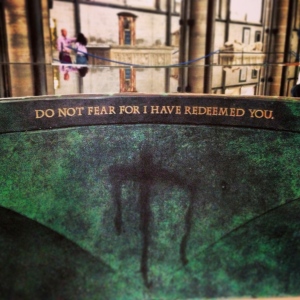This week the SheReadsTruth writers issued a bigger challenge! To write about the first two chapters of Jonah.
I’ve recently written an overview of the whole book of Jonah, which will be published on the Partakers website in mid April – I will be contributing a weekly podcast (with transcript), summarising each the 12 books of the minor prophets. The series begins on Thurs 3rd April with an introduction, followed by Jonah on week 2!
For this week’s challenge I thought I’d look afresh at these first two chapters of Jonah and reflect on the things that stand out to me.
Now the word of the LORD came to Jonah the son of Amittai, saying, “Arise, go to Nineveh, that great city, and call out against it, for their evil has come up before me.”
But Jonah rose to flee to Tarshish from the presence of the LORD. He went down to Joppa…away from the presence of the LORD.
The book of Jonah is a literary masterpiece. It’s full of irony, satire, contrasts and drama. In the opening of the first chapter the reader is presented with Jonah’s stark disobedience:
- God says “Arise”, “get up”, but Jonah went down.
- God says “Go to..”, but Jonah flees away.
Jonah’s attempt to run away from God’s presence is so futile, it’s oddly amusing.
The contrasts continue as Jonah boards the ship to Tarshish.
- The sailors pray to their gods, whilst Jonah sleeps, oblivious to the trouble.
- The sailors fear Jonah’s God, whilst Jonah underestimates God’s power and intent.
- The pagan sailors show remarkable restraint and mercy when dealing with Jonah, trying everything they can before finally throwing him overboard. Jonah shows no hint of such mercy towards the people of Nineveh.
And Jonah continues to go down, down, down to the depths of the sea. But God brings him up again. The giant fish swallows him and then unceremoniously vomits him up on the beach.
The little sentence about Jonah going down to sleep in the inner part of the ship during the storm makes me think of the time Jesus slept in the stern of the boat whilst his disciples struggled in a storm. But whilst it took the sacrifice of Jonah into the sea to calm one storm, Jesus (the Greater Jonah) spoke the other storm into submission. The Greater Jonah would also sacrifice himself for the lives of others, but on a barren hill, not a stormy sea.
Jonah cried to God from inside the fish, and God answered him in his time of distress. The Greater Jonah cried out on the cross, “my God, my God, why have you forsaken me?” And for the only time in all eternity, the Father did not respond.
Jonah, truly humbled, was raised from the deep after 3 days, by the sheer mercy and grace of God.
Jesus, truly glorious, was raised from the dead after 3 days, because death could not hold him!
As Jesus himself said:
“For just as Jonah was three days and three nights in the belly of the great fish, so will the Son of Man be three days and three nights in the heart of the earth. The men of Nineveh will rise up at the judgment with this generation and condemn it, for they repented at the preaching of Jonah, and behold, something greater than Jonah is here.” Matthew 12:40-41

